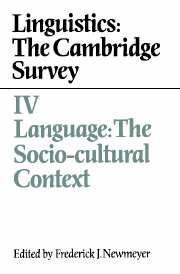Book contents
- Frontmatter
- Contents
- Contributors
- Preface
- 1 The study of language in its socio-cultural context
- 2 Language, culture, and world-view
- 3 Language and social class
- 4 Language and race: some implications for linguistic science
- 5 Language and gender
- 6 Bilingualism
- 7 Dialectology
- 8 Sociolinguistics and syntactic variation
- 9 Language birth: the processes of pidginization and creolization
- 10 Language death
- 11 Language planning: the view from linguistics
- 12 Ethnography of speaking: toward a linguistics of the praxis
- 13 The organization of discourse
- 14 Conversation analysis
- Index of names
- Index of subjects
- Contents of Volumes I, II, and III
2 - Language, culture, and world-view
Published online by Cambridge University Press: 05 June 2012
- Frontmatter
- Contents
- Contributors
- Preface
- 1 The study of language in its socio-cultural context
- 2 Language, culture, and world-view
- 3 Language and social class
- 4 Language and race: some implications for linguistic science
- 5 Language and gender
- 6 Bilingualism
- 7 Dialectology
- 8 Sociolinguistics and syntactic variation
- 9 Language birth: the processes of pidginization and creolization
- 10 Language death
- 11 Language planning: the view from linguistics
- 12 Ethnography of speaking: toward a linguistics of the praxis
- 13 The organization of discourse
- 14 Conversation analysis
- Index of names
- Index of subjects
- Contents of Volumes I, II, and III
Summary
Introduction: the Whorf hypothesis
The human, social world is a meaningful one, and speech is the most important device by which humans create and distribute meaning. The determination of the constraints on this creation and distribution, and the role of language in the relationship between cognizing human beings and the cognized environment, are central concerns of scholars in many disciplines.
A thorough review would require attention at least to the literatures of philosophy, psychology, anthropology, and the literary theory of translation. The role of language as a map for social action is a practical as well as an intellectual concern, as evidenced in work by feminist scholars (see McConnell-Ginet, Borker & Furman 1980), to note only one example. The present review will concentrate primarily on the shapes that these concerns have assumed within anthropology during the last decade.
Modern anthropologists concerned with the relationship between language, culture, and world view trace their intellectual genealogy through a ‘Whorf hypothesis’: that the forms of meaning created in the syntactic, morphological, and phonological patterns of language can vary more or less without limit, and that these forms, which constitute reifications of the world, are powerful mediators of human understanding, which should in its own turn assume a more or less unlimited range of forms.
- Type
- Chapter
- Information
- Linguistics: The Cambridge Survey , pp. 14 - 36Publisher: Cambridge University PressPrint publication year: 1988
- 16
- Cited by



